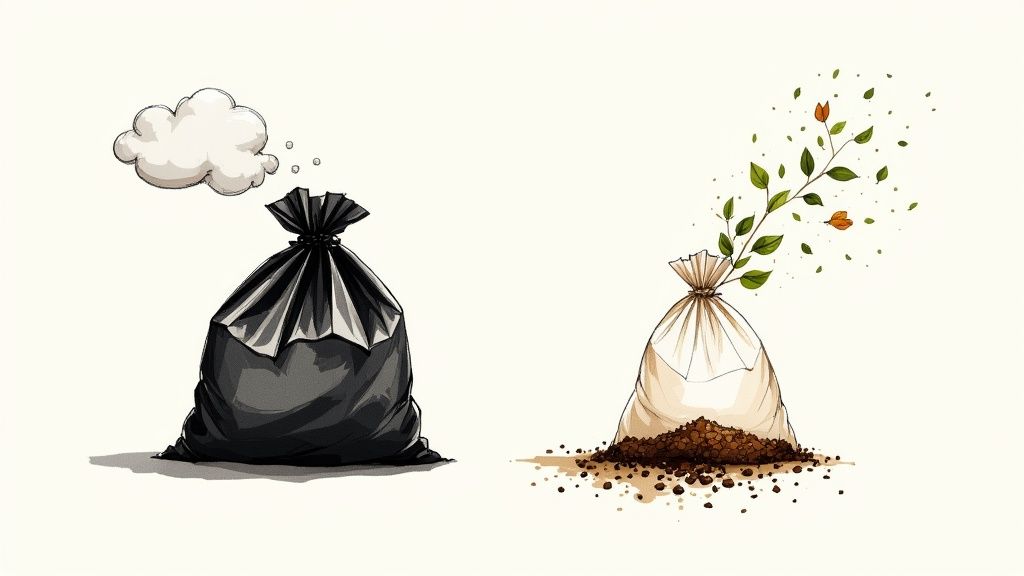
A Guide to Biodegradable Products and Compostable Poop Bags
Biodegradable poop bags are pitched as a smart alternative to traditional plastic, designed to break down naturally with a bit of help from microorganisms. Unlike your standard plastic bags that hang around in the environment for hundreds of years, these bags are made from materials, often plant-based, that can return to the earth, helping to cut down on long-term pollution and the ever-growing landfill burden.
Demystifying the World of Eco-Friendly Poop Bags

Every year, Aussies go through billions of plastic bags. It’s a staggering number, and a huge chunk of them end up in landfill, creating an environmental problem that just won’t go away. Traditional plastic bags are like those unwanted house guests who never leave; they eventually fragment into smaller microplastics but never truly disappear. This kicks off a nasty cycle of pollution that harms our wildlife and precious ecosystems.
This is exactly the problem that biodegradable poop bags are here to solve.
Think of them like an organic apple core in your compost heap versus the plastic wrapper it came in. One is designed to be gobbled up by nature, while the other sticks around pretty much forever. These eco-friendly bags are made from materials that living organisms like bacteria and fungi can actually digest, turning them back into simple, natural bits like water, carbon dioxide, and biomass.
Understanding the Key Differences
But let's be honest, the eco-friendly aisle can be a confusing place. The words plastered on packaging often sound similar but mean vastly different things. Getting your head around these distinctions is the first real step toward making a sustainable choice. Without that clarity, it's all too easy to grab a product that doesn't actually deliver the environmental benefits you’re hoping for.
Let's break down the three most common terms you'll bump into:
- Biodegradable: This is a super broad term. It just means the product can be broken down by microorganisms over time. The catch? It doesn't specify how long it will take or what it will break down into. Some so-called "biodegradable" plastics can still leave behind nasty residues.
- Degradable: This term is often a bit of a trap. Degradable plastics are usually just conventional plastics with additives that make them break apart into tiny fragments when hit by sunlight or heat. They don't actually disappear; they just become microplastics, which can be even more of a menace.
- Compostable: Now this is the gold standard. For a bag to be certified compostable in Australia, it has to meet strict standards (like AS 4736 or AS 5810). This is your guarantee that it will break down into non-toxic organic matter within a set timeframe, usually 90-180 days, under the right composting conditions.
The real game-changer here is certification. While 'biodegradable' can sometimes be a fuzzy marketing claim, 'certified compostable' is a promise. It assures you the product has been properly tested to safely return to the earth, leaving nothing harmful behind.
Choosing the right type of biodegradable poop bag, especially those with official compostable certifications, makes sure your small daily habits are actually making a positive difference to Australia’s bigger environmental goals. It’s about looking past the green-coloured labels and making an informed choice that genuinely supports a healthier planet. Once you understand the basics, you're empowered to pick a product that truly aligns with your sustainable values.
The True Environmental Impact of Your Choice
Switching from a regular plastic bag to a biodegradable poop bag might seem like a small change in your walking routine. But this one simple swap sends positive ripples across Australia's environment, connecting your daily walk directly to our biggest national waste challenges.
Think of it this way: every time you use a certified biodegradable or compostable bag for your dog's waste, you're diverting organic matter from landfill. When waste gets trapped in a landfill without oxygen, it breaks down anaerobically. This process releases methane, a greenhouse gas over 25 times more potent than carbon dioxide.
By choosing bags designed to break down properly, you're actively cutting down on these harmful emissions. It’s a simple everyday habit that turns a mundane task into a meaningful act of climate care.
Confronting Australia's Plastic Problem
The push for better alternatives like biodegradable poop bags comes from a very real place: Australia's packaging waste crisis. The numbers are pretty confronting.
Recent data shows that in 2018–19, a massive 2.9 million tonnes of packaging ended up in Australian landfills. That’s nearly half of all packaging that hit the market. While we have a national goal to recycle 70% of plastics by 2025, we're a long way off—only 18% of plastic packaging is currently being recycled.
These stats tell us that recycling, while important, isn't going to solve the problem on its own. We need solutions that stop persistent plastics from entering our waste stream in the first place. That’s exactly where biodegradable poop bags come in.
Choosing a biodegradable or compostable bag is more than just a personal preference; it's a vote for a system that values resource recovery over permanent waste. It signals a demand for products designed with their end-of-life in mind.
Every dog parent that makes the switch adds to a massive collective impact. It’s not just about one less plastic bag in landfill; it’s about changing our whole relationship with disposable products. This shift helps build what’s known as a circular economy, where materials are safely returned to the earth instead of being thrown away for good.
By embracing these alternatives, you’re not just cleaning up after your dog—you’re helping to build a more sustainable future for Australia, one walk at a time.
What Are Biodegradable Poop Bags Actually Made From?
To really get why biodegradable poop bags are a smart choice, we need to peek behind the curtain and understand the clever science that makes them work. These aren't just your standard plastic bags with a green sticker slapped on; they're the result of some seriously advanced material science, engineered to break down and return to nature.
The secret is in their unique, plant-based recipe.
Think of it like building something tough and reliable, but with a secret self-destruct button that only gets pushed under natural conditions. That's the core idea. The most common building blocks are bioplastics, which are plastics made from renewable sources like plants.
This infographic gives you a quick breakdown of what you'll typically find inside many of the biodegradable poop bags on the Aussie market.

As you can see, materials like PLA and PBAT are the heavy lifters, each bringing something different to the table to create a bag that’s both dependable and sustainable.
The Key Plant-Based Ingredients
Let's dig into the main ingredients that give these bags their eco-friendly superpowers. Each one has a specific job, contributing to the bag's final strength, stretchiness, and—most importantly—its ability to break down.
- PLA (Polylactic Acid): Usually made from the fermented starch of plants like corn, sugarcane, or cassava. PLA brings the rigidity and strength, making sure the bag is tough enough to handle waste without tearing.
- PBAT (Polybutylene Adipate Terephthalate): Known for its flexibility and toughness. It’s the ingredient that gives the bag its stretch, stopping it from splitting or leaking.
- Starch Blends: Natural starches, often from corn or potatoes, are mixed in with PLA and PBAT. They're cheap, highly biodegradable, and help speed up the decomposition process once the bag hits a compost environment.
These materials are blended in a carefully balanced formula. The PLA gives it structure, the PBAT adds flexibility and puncture resistance, and the starch makes sure it all breaks down properly. It’s this precise recipe that creates a bag that’s practical for you and friendly to the planet.
The Future of Materials in Australia
Innovation in this space is moving at lightning speed, especially right here in Australia. Biodegradable poop bags are just one part of a bigger shift in our packaging industry towards smarter, sustainable materials.
Researchers and manufacturers are already working on exciting new bioplastics made from renewable sources like algae and seaweed. Globally, 81 companies (including some Aussie innovators) are developing algae-based bioplastics, and 55 related patents have been filed since 2011—a sure sign this sector is booming. You can get the full scoop in this report on Australia's biodegradable packaging market.
This constant search for better materials is vital. It means the products we use every day, like poop bags, are not just effective but are also designed for a circular economy—a system where waste is eliminated from the get-go.
It’s important to understand this stuff, especially when you discover the compostable difference and what it means for your own composting efforts at home. By choosing products made from certified materials, you’re backing a system that turns waste into a valuable resource, closing the loop and helping create a healthier environment for everyone.

